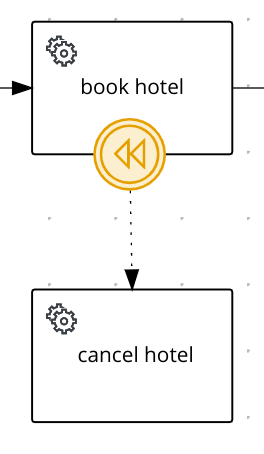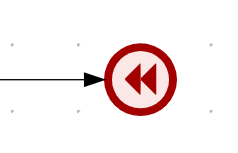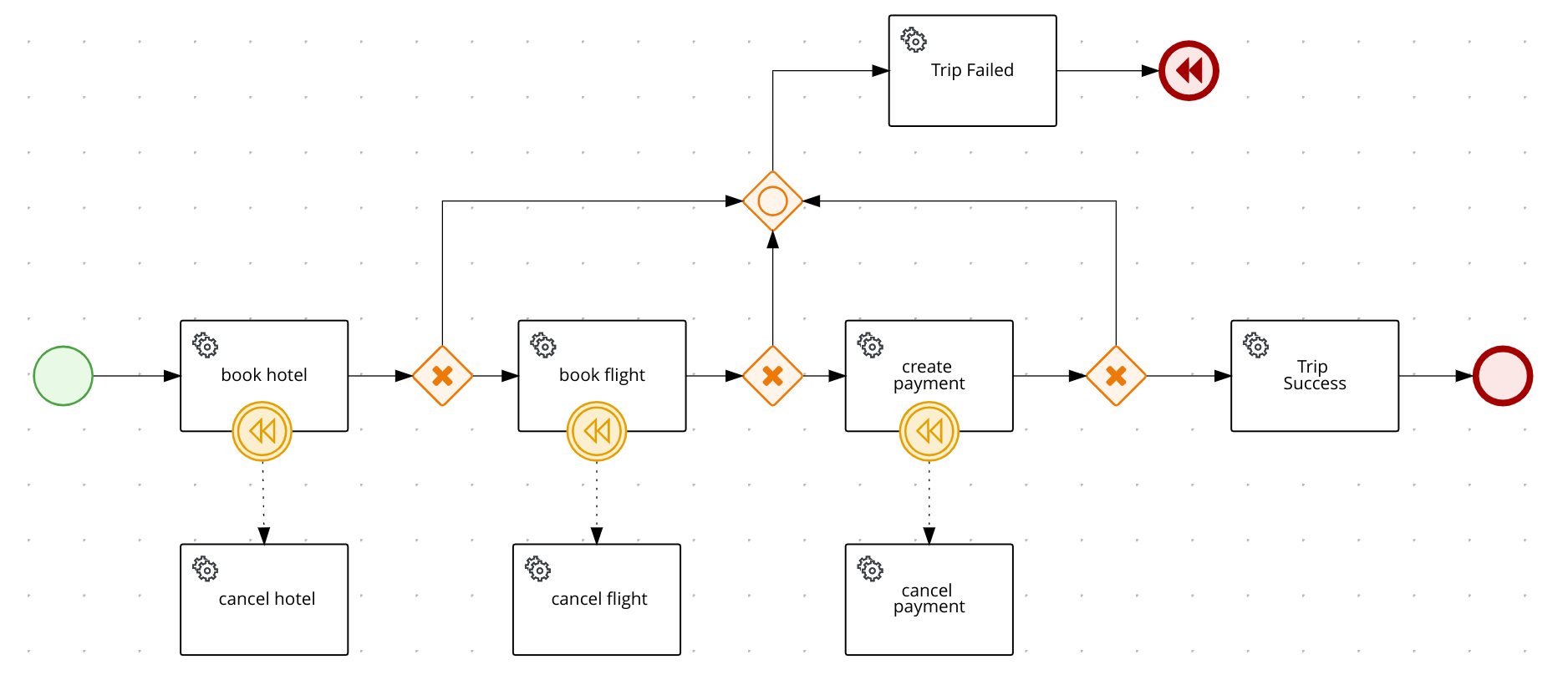This is a standalone version of this https://github.com/tiagodolphine/kogito-examples/tree/process-saga-example
Service to demonstrate how to implement Saga pattern based on BPMN process with Kogito. The proposed example is based on an Order Fulfillment process which consists in a sequence of steps, that could represent calls to external services, microservices, serverless functions, etc.
All steps stock, payment and shipping should be executed to confirm an Order, if any of the
steps fail, then a compensation for each completed step should be executed to undo the operation or to keep the
process on a consistent state. For instance, reserve stock step, should cancel the stock reservation. The
compensations for the steps are represented in the process using a boundary Intermediate Catching Compensation Event attached to the respective step to be compensated.
The catching compensation events can be triggered by an Intermediate Throwing Compensation Event or the
Compensation End Event in any point of the process that represents an error or inconsistent state, like a response
from a service.
The steps and compensations actions in the process example are implemented as service tasks using a Java class under
the src of the project, and for this example they are just mocking responses, but in a real use case they
could be executing calls to external services through REST, or any other mechanism depending on the architecture.
The start point of Saga process is to submit a request to create a new Order with a given orderId, this could be
any other payload that represents an Order, but for the sake of simplicity, in this example it will be
based on the id that could be used as a correlation to client starting the Saga.
The output of each step, is represented by a Response that contains a type, indicating success or error
and the id of the resource that was invoked in the service, but this could be any kind of response depending on
the requirement of each service.
This is the BPMN process that represents the Order Saga, and it is the one being used in the project to be built using kogito.
You will need:
- Java 11+ installed
- Environment variable JAVA_HOME set accordingly
- Maven 3.6.2+ installed
When using native image compilation, you will also need:
- GraalVM 19.1.1 installed
- Environment variable GRAALVM_HOME set accordingly
- Note that GraalVM native image compilation typically requires other packages (glibc-devel, zlib-devel and gcc) to be installed too. You also need 'native-image' installed in GraalVM (using 'gu install native-image'). Please refer to GraalVM installation documentation for more details.
mvn clean compile quarkus:dev
mvn clean package
java -jar target/quarkus-app/quarkus-run.jar
!!! NOT TESTED !!! Note that this requires GRAALVM_HOME to point to a valid GraalVM installation
mvn clean package -Pnative
To run the generated native executable, generated in target/, execute
./target/process-saga-quarkus-runner
Note: Native builds does not yet work on Windows, GraalVM and Quarkus should be rolling out support for Windows soon.
You can take a look at the OpenAPI definition - automatically generated and included in this service - to determine all available operations exposed by this service. For easy readability you can visualize the OpenAPI definition file using a UI tool like for example available Swagger UI.
In addition, various clients to interact with this service can be easily generated using this OpenAPI definition.
When running in either Quarkus Development or Native mode, we also leverage the Quarkus OpenAPI extension that exposes Swagger UI that you can use to look at available REST endpoints and send test requests.
Once the service is up and running, you can use the following examples to interact with the service. Note that rather than using the curl commands below, you can also use the Swagger UI to send requests.
Allows to start a new Order Saga with the given data:
Given data:
{
"orderId" : "03e6cf79-3301-434b-b5e1-d6899b5639aa"
}Curl command (using the JSON object above):
curl -H "Content-Type: application/json" -X POST http://localhost:8080/orders -d '{"orderId" : "03e6cf79-3301-434b-b5e1-d6899b5639aa"}'The response for the request is returned with attributes representing the response of each step, either
success or failure. The orderResponse attribute indicates if the order can be confirmed in case of success or
canceled in case of error.
Response example:
{
"id": "902a2caa-4ed0-4675-96e8-1434e1ea5bde",
"paymentResponse": {
"type": "SUCCESS",
"resourceId": "af87e7b8-e455-4170-96e0-8bf23081158a"
},
"tripResponse": {
"type": "SUCCESS",
"resourceId": "03e6cf79-3301-434b-b5e1-d6899b5639aa"
},
"failService": null,
"hotelResponse": {
"type": "SUCCESS",
"resourceId": "54101773-9a20-4e53-963c-353891ed8517"
},
"orderId": "03e6cf79-3301-434b-b5e1-d6899b5639aa",
"flightResponse": {
"type": "SUCCESS",
"resourceId": "523d33be-815c-44f7-b52b-2337b770872d"
}
}In the console executing the application you can check the log it with the executed steps.
2020-11-05 16:23:32,478 INFO [org.kie.kog.HotelService] (executor-thread-198) Book Hotel for t 3e6cf79-3301-434b-b5e1-d6899b5639aa
2020-11-05 16:23:32,481 INFO [org.kie.kog.FlightService] (executor-thread-198) Book Flight for t 3e6cf79-3301-434b-b5e1-d6899b5639aa
2020-11-05 16:23:32,481 INFO [org.kie.kog.PaymentService] (executor-thread-198) Create Payment for t 3e6cf79-3301-434b-b5e1-d6899b5639aa
Trip Success
To make testing the process easier it was introduced an optional attribute failService that indicates which service
should respond with an error. The attribute is basically the simple name of the service type, "Stock", "Payment" or "Shipping".
Example:
{
"orderId" : "03e6cf79-3301-434b-b5e1-d6899b5639aa",
"failService" : "Payment"
}Curl command (using the JSON object above):
curl -H "Content-Type: application/json" -X POST http://localhost:8080/orders -d '{"orderId" : "03e6cf79-3301-434b-b5e1-d6899b5639aa", "failService" : "Payment"}' Response example:
{
"id": "501b67be-5e55-408b-ae69-2d34f71625c4",
"stockResponse": {
"type": "SUCCESS",
"resourceId": "8adb55fb-b22e-4128-82e0-189e65a54e3a"
},
"paymentResponse": {
"type": "ERROR",
"resourceId": "e3389be1-be0f-4a92-a8d3-6066ac82a4d5"
},
"orderId": "03e6cf79-3301-434b-b5e1-d6899b5639aa",
"failService": "Payment",
"orderResponse": {
"type": "ERROR",
"resourceId": "03e6cf79-3301-434b-b5e1-d6899b5639aa"
},
"shippingResponse": null
}
In the console executing the application you can check the log it with the executed steps.
10:52:49:487 INFO [org.kie.kogito.StockService_Subclass] Created Stock for 03e6cf79-3301-434b-b5e1-d6899b5639aa with Id: 8adb55fb-b22e-4128-82e0-189e65a54e3a
10:52:49:488 INFO [org.kie.kogito.PaymentService_Subclass] Created Payment for 03e6cf79-3301-434b-b5e1-d6899b5639aa with Id: e3389be1-be0f-4a92-a8d3-6066ac82a4d5
10:52:49:489 WARN [org.kie.kogito.PaymentService_Subclass] Cancel Payment for e3389be1-be0f-4a92-a8d3-6066ac82a4d5
10:52:49:489 WARN [org.kie.kogito.StockService_Subclass] Cancel Stock for 8adb55fb-b22e-4128-82e0-189e65a54e3a
10:52:49:490 WARN [org.kie.kogito.OrderService] Failed Order 03e6cf79-3301-434b-b5e1-d6899b5639aa
In the operator directory you'll find the custom resources needed to deploy this example on OpenShift with the Kogito Operator.


